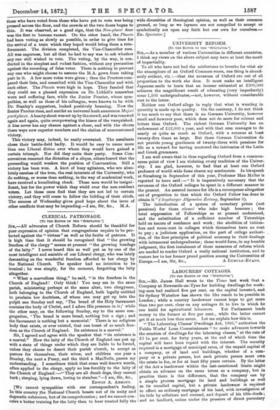CLERICAL PATRONAGE.
[TO THE EDITOR OF THE " SPEOTSTOR.1
Sin,—All advocates of Church Reform should be thankful for your expression of opinion that congregations require to be pro- tected against the " virtues" as well as the faults of patrons. It is high time that it should be recognised that " the growing freedom of the clergy" means at present "the growing bondage of the laity." I never heard this so well put as by one of the most intelligent and amiable of our Liberal clergy, who was lately descanting on the wonderful freedom afforded to her clergy by the National Church. The speaker had no intention to be ironical ; be was simply, for the moment, forgetting the laity altogether.
" What a marvellous thing," he said, " is the freedom in the Church of England! Only think ! You may see in the same parish, ministering perhaps at the same altar, two clergymen, both belonging to the Church of England, both legally entitled to proclaim her doctrines, of whom one may get up into the pulpit one Sunday and say, The bread of the Holy Sacrament contains the body of Christ, and I adore His presence in it;' while the other may, on the following Sunday, say to the same con- gregation, The bread is mere bread, nothing but a sign ; and the Sacrament is nothing but a memorial.' There is no religious body that exists, or ever existed, that can boast of so much free- dom as the Church of England. Its existence is a marvel."
Sir, I agreed and agree with the speaker that "its existence is a marvel." How the laity of the Church of England can put up with a state of things under which they are liable to be forced, unless they choose to desert their parish church, to accept as pastors for themselves, their wives, and children oue year a Stanley, the next a Pusey, and the third a MacNeile, passes my understanding. I sometimes think that some well-known words, often applied to the clergy, apply no less forcibly to the laity of the Church of England :—" They are all dumb dogs, they cannot bark ; sleeping, lying down, loving to slumber."—I am, Sir, &c.,
EDWIN A. ABBOTT.
[We cannot sympathise with our correspondent's feeling. In this country the National Church boasts not of its unity and dogmatic coherence, but of its comprehension ; and we cannot con- ceive a better training for the laity than to hear treated fully the
wide diversities of theological opinion, as well as their common ground, so long as we laymen are not compelled to accept or symbolically act upon any faith but our own for ourselves.— En. Spectator.]










































 Previous page
Previous page